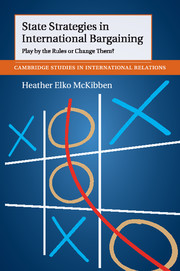Book contents
- State Strategies in International Bargaining
- Cambridge Studies in International Relations : 134
- State Strategies in International Bargaining
- Copyright page
- Dedication
- Contents
- Figures
- Tables
- Book part
- Glossary
- 1 Introduction: it’s a question of strategies
- I Rule-compliant/rule-changing framework
- II Research design and empirical tests
- Book part
- References
- Index
- Cambridge Studies in International Relations
- References
References
Published online by Cambridge University Press: 05 January 2015
- State Strategies in International Bargaining
- Cambridge Studies in International Relations : 134
- State Strategies in International Bargaining
- Copyright page
- Dedication
- Contents
- Figures
- Tables
- Book part
- Glossary
- 1 Introduction: it’s a question of strategies
- I Rule-compliant/rule-changing framework
- II Research design and empirical tests
- Book part
- References
- Index
- Cambridge Studies in International Relations
- References
- Type
- Chapter
- Information
- State Strategies in International BargainingPlay by the Rules or Change Them?, pp. 284 - 299Publisher: Cambridge University PressPrint publication year: 2015



